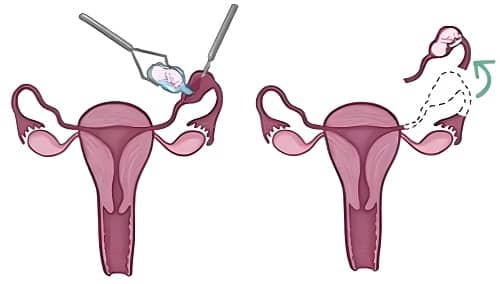Ectopic pregnancy occurs when a fertilized egg implants outside the uterus, such as in the fallopian tube, ovary, or abdominal cavity. Due to the significant health risks associated with ectopic pregnancy, timely and appropriate treatment is essential. The choice of treatment depends on the patient’s physical condition, the stage of the ectopic pregnancy, and the clinical presentation. Here are some common treatment methods:

Table of Contents
- 1. Laparoscopic Minimally Invasive Surgery
- 2. Emergency Surgery
- 3. Medical Treatment
- 4. Personalized Treatment
1. Laparoscopic Minimally Invasive Surgery
Laparoscopic surgery is one of the most common treatments for ectopic pregnancy. The surgeon makes a few small incisions in the abdomen and uses specialized instruments to access the pelvic cavity, allowing precise removal of the ectopic pregnancy while minimizing damage to surrounding organs. This minimally invasive method offers less trauma, quicker recovery, and is especially suitable for patients with stable conditions and a clearly identifiable ectopic pregnancy.
- Advantages: Less trauma, faster recovery, shorter hospital stay, fewer complications.
- Indications: Clearly identified ectopic pregnancy, stable condition, no severe bleeding.
In addition, laparoscopic surgery allows a comprehensive examination of other pelvic areas, which helps identify and address any potential issues, reducing the risk of future ectopic pregnancies.
2. Emergency Surgery
In cases where the patient experiences severe symptoms such as intense abdominal pain or significant internal bleeding, emergency surgery is the fastest and most effective treatment option. The surgery is typically performed through a larger incision to quickly control bleeding and remove the pregnancy tissue. While this method involves more trauma, it is crucial for saving lives and handling critical situations.
- Advantages: Quick, direct control of bleeding, handling life-threatening emergencies.
- Indications: Severe symptoms, such as heavy bleeding or intense abdominal pain.
Emergency surgery can save lives but may have a longer recovery time and potentially affect future fertility. Therefore, early diagnosis and timely treatment are critical in preventing the need for emergency surgery.
3. Medical Treatment
For early-stage ectopic pregnancies with mild symptoms, medical treatment may be an effective option. This treatment uses medications to stop the development of the pregnancy tissue and allow the body to gradually absorb the abnormal tissue.
- Advantages: No surgery, minimal trauma, suitable for early-stage ectopic pregnancies with no significant symptoms.
- Indications: Early ectopic pregnancy, small pregnancy sac, no rupture, and no severe symptoms.
Medical treatment requires close monitoring to ensure safety and efficacy, with regular checks of hCG levels to confirm the treatment’s success.
4. Personalized Treatment
Each patient’s condition and health status are unique, so treatment plans need to be personalized. The doctor will consider factors such as the patient’s fertility plans, overall health, and the severity of the ectopic pregnancy before choosing the most suitable treatment method.
- Advantages: Tailored treatment based on the patient’s specific needs and health conditions.
- Indications: Patients with varying degrees of ectopic pregnancy.
Personalized treatment can enhance the effectiveness of the treatment, reduce side effects, and help the patient recover while preserving future fertility.
Friendly Reminder
Ectopic pregnancy is a health issue that requires urgent attention. If you experience abnormal abdominal pain, irregular bleeding, or any other symptoms related to ectopic pregnancy, seek medical attention immediately for professional evaluation and treatment. Early diagnosis and treatment are essential for safeguarding your health. Maintaining a healthy lifestyle and having regular check-ups can help reduce the risk of ectopic pregnancy.